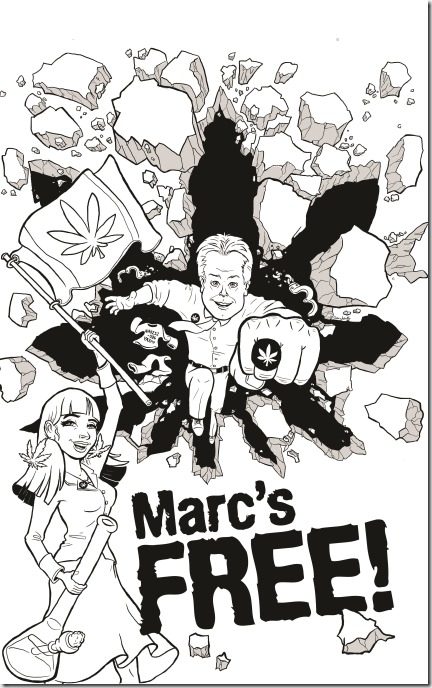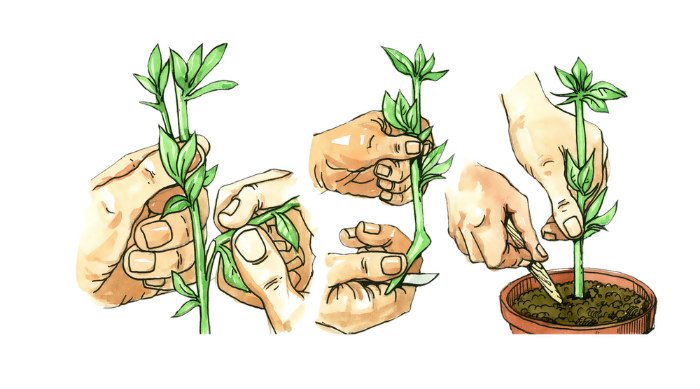Cystic Fibrosis is a condition that causes your lungs to fill up with fluid. For people living with it, smoking weed sounds like a dangerously stupid idea. However, there are people out there that not only do it, but they also swear that the weed is what keeps them alive.
This now begs the question, how does cannabis interact with fluid-filled lungs? The answer from the medical community would likely be a negative one, but the blanket experience of many does not erase the evidence. Even in extreme cases, it’s not hard to find exceptions to the rule. As such, this topic deserves a deeper look. We all know what we’ve been told about cannabis and the way it should affect our lungs, but for the sake of critical thinking, let’s take a look at CF and a particular case that doesn’t fit the status quo.
Cystic Fibrosis
Our exocrine glands are responsible for transporting water and other substances in and out of our cells – these substances do not go back into our bloodstream but are instead pushed out of the body. For example, our sweat, tears, and breast milk are all secreted by an exocrine gland. When someone has CF, these glands don’t work effectively and fluid collects all over the body, eventually resulting in death. Cystic fibrosis affects the pancreas, liver, skin, digestive system, and sinuses, but most of all, the lungs. Thick, sticky mucus builds up, clogging airways, and blocking the intake of oxygen. According to The 2017 Cystic Fibrosis Foundation Patient Registry Highlights, “Among people with CF born between 2013 and 2017, half are predicted to live to 44 years old or more”.
Current Treatments – Mucus thinning medication, anti-inflammatories, and antibiotics to prevent lung infections, medications to aid in digestion and reduce the stomach problems associated with CF, and airway clearance techniques aka chest physical therapy.
Dab Life
Joseph (not his real name), is a middle-aged man living with CF. He relies on dispensaries to access his medicine – cannabis concentrates. Mobility is limited and he is wheelchair-bound. To help him breathe, Joseph has a tracheotomy. If you ask him about his health, he will tell you that he is only alive because of the shatter he smokes.
Using a sublimation, Joseph has his worker melt the dab onto the element, inhaling until the empty chamber is full. He puts the sublimation tube directly into the opening of his tracheotomy and inhales the dab. The reason that this is such an effective treatment for Joseph is that it creates airway clearance without making him panic.
Dabbing makes him cough up all the gunk in his lungs but gets him stoned at the same time. If he’s having a giant coughing fit, he doesn’t freak out or react like he’s drowning; it just feels like he took a massive toke. Using flowers is a little bit rough for his lungs but it can work in a pinch. For Joseph, a dab of shatter is the most effective treatment for his CF.
The effect cannabis has on the body
BRONCHODILATION
Multiple studies have shown that using cannabis works as a bronchodilator – opening your airways instead of constricting them. This is significant because it provides a safer option than alternatives like opiates. Many narcotics can increase our lung capacity but they can also cause issues with the exchange of oxygen and carbon dioxide – a common condition known as central respiratory depression. Luckily, cannabis doesn’t cause this effect. So just how does using cannabis open up our lungs? When it comes to bronchodilation, there are two ways:
1. Research has shown that CB1 activation can inhibit the action of the neurotransmitter acetylcholine, reducing the constricting effect it has on smooth muscle tissue. As a result, fluids and gasses are free to flow.
2. A British study found a correlation between the positive emotional effects of cannabis and the increase in lung capacity. This seems like common sense because of the way that we feel affects our breathing. For someone asthmatic, fear or panic can often trigger an attack, but a relaxed mind leads to a relaxed breath. Whether it’s because of pain being relieved or simply the cannabinoids, the calming and happy effects of cannabis causes an increase in our lung capacity. As the weed hits you and you start to relax, your lungs respond and open up.
FLUID EXPECTORANT
No question about it, smoking cannabis acts as an expectorant, promoting the discharge of phlegm and fluid within the lungs. For a substance to cause this effect on mucus, it needs to either thin it out and/or help phlegm discharge. Cannabis does this by:
- Dilating soft tissue and blood vessels in the lungs, thus creating a highway to release key thinning components.
- Making you cough and discharge all the gunk
IT RELIEVES ANXIETY
One of the worst things that Joseph had to deal with was gasping for breath during chest physical therapy. He said it was terrifying because once he would start to cough up the crap that had collected in his lungs, he never knew when he would be able to inhale again. As a result, he would often suffer panic attacks before his treatments.
Finding cannabis changed everything because of the relaxing effect the plant would have, and he started to associate his new form of chest physical therapy with getting stoned. Joseph began to look forward to it, and naturally, his body began responding incredibly well. Today, he dabs cannabis concentrates looking forward to more than just the effects; knowing that it makes it easier to breathe.
While concentrates are legal, and many other forms of cannabis, are legal, their availability and product selection are severely limited. Furthermore, their price point, and specificity, may not cater to the needs of medicinal patients, such as Joseph. This is where compassion clubs and remaining medicinal dispensaries have filled the void, though doing so illegally.
And so, if it were not for them, coupled with the willingness of his workers, Joseph would not be able to use the equipment needed to consume cannabis, his medicine. His well being is literally in the hands of a team that saves his life through illegal means.
As research continues to advance and improve, people who suffer from CF are living better, longer lives. The addition of advanced cannabis research within that will only move to strengthen and benefit patients further as well.
References:
2017 Cystic Fibrosis Foundation Patient Registry Highlights
Single-Dose Effect of Marihuana Smoke — Bronchial Dynamics and Respiratory-Center Sensitivity in Normal Subjects
Louis Vachon, M.D., Muiris X. FitzGerald, M.D., Norman H. Solliday, M.D., Ira A. Gould, M.D., and Edward A. Gaensler, M.D.
https://www.nejm.org/doi/full/10.1056/NEJM197305102881902
Acute effects of smoked marijuana and oral delta-9-tetrahydrocannabinol on specific airway conductance in asthmatic subjects
American Review of Respiratory Disease, Volume 109, 1974, p. 420-428
By Donald P. Tashkin, Bertrand J. Shapiro, and Ira M. Frank
https://www.ukcia.org/research/SmokedAndOralInAsthmatic.php
Cannabis Science Develops Inhalation Medication for Those Suffering Asthma/COPD via Nebulizer, Targets National Markets
Cannabis Science, Inc. July 29, 2016 14:22 ET




